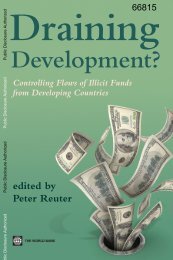International Trade in Services.pdf - DSpace at Khazar University
International Trade in Services.pdf - DSpace at Khazar University
International Trade in Services.pdf - DSpace at Khazar University
Create successful ePaper yourself
Turn your PDF publications into a flip-book with our unique Google optimized e-Paper software.
Account<strong>in</strong>g <strong>Services</strong> 271<br />
Box 8.3: Examples of Domestic Regul<strong>at</strong>ions Th<strong>at</strong> May Impede <strong>Trade</strong> <strong>in</strong><br />
Account<strong>in</strong>g <strong>Services</strong><br />
Rules are c<strong>at</strong>egorized to determ<strong>in</strong>e their potential impact on the trade <strong>in</strong> services.<br />
Rules th<strong>at</strong> potentially may <strong>in</strong>hibit market access can be c<strong>at</strong>egorized as follows:<br />
• Quantit<strong>at</strong>ive limit<strong>at</strong>ions on services providers, services, oper<strong>at</strong>ions, and output: for<br />
example, limit<strong>at</strong>ions on the number of auditors or accountants<br />
• The value of service transactions or assets: for example, the value of foreign<br />
subsidiaries is limited to a certa<strong>in</strong> share of the total domestic assets of the sector<br />
• Constra<strong>in</strong>ts on the type of legal entity or jo<strong>in</strong>t venture: for example, prohibitions on<br />
partnerships and constra<strong>in</strong>ts on the establishment of jo<strong>in</strong>t ventures<br />
• Rules on the particip<strong>at</strong>ion of foreign capital<br />
Rules th<strong>at</strong> potentially distort competition and deny n<strong>at</strong>ional tre<strong>at</strong>ment <strong>in</strong>clude<br />
measures such as the follow<strong>in</strong>g:<br />
• Subsidy measures: for example, eligibility for subsidies is reserved to n<strong>at</strong>ionals<br />
• Tax measures: for example, foreign firms are assessed discrim<strong>in</strong><strong>at</strong>ory excise taxes<br />
• N<strong>at</strong>ionality requirements: for example, managers, accountants, and auditors must<br />
be citizens<br />
• Licens<strong>in</strong>g and qualific<strong>at</strong>ion requirements: for example, licens<strong>in</strong>g and qualific<strong>at</strong>ion<br />
are reserved for citizens; professionals must be gradu<strong>at</strong>es of n<strong>at</strong>ional universities; an<br />
<strong>in</strong>-country professional practice is required<br />
• Registr<strong>at</strong>ion requirements: for example, foreign companies are required to have an<br />
office registered <strong>in</strong> the country<br />
<strong>Trade</strong> negoti<strong>at</strong>ions have prompted governments to reexam<strong>in</strong>e such rules, their<br />
purpose, and their impact on service markets. As a consequence, policy makers may<br />
ref<strong>in</strong>e such rules to facilit<strong>at</strong>e trade. For <strong>in</strong>stance, they may lift quantit<strong>at</strong>ive limit<strong>at</strong>ions<br />
on service providers, loosen jo<strong>in</strong>t venture requirements, or raise foreign capital<br />
ceil<strong>in</strong>gs. Policy makers might also f<strong>in</strong>d altern<strong>at</strong>ives for n<strong>at</strong>ionality requirements,<br />
streaml<strong>in</strong>e licens<strong>in</strong>g and qualific<strong>at</strong>ion requirements, and make registr<strong>at</strong>ion requirements<br />
more transparent. Policy makers may make these changes as a reflection of<br />
market conditions <strong>at</strong> home and <strong>in</strong> export markets of <strong>in</strong>terest. Regul<strong>at</strong>ions adm<strong>in</strong>istered<br />
with <strong>in</strong>tegrity and restra<strong>in</strong>t provide predictability and confidence <strong>in</strong> market<br />
oper<strong>at</strong>ions for <strong>in</strong>vestors and service <strong>in</strong>dustry users.<br />
<strong>in</strong>form<strong>at</strong>ion about adm<strong>in</strong>istr<strong>at</strong>ive procedures and processes. For <strong>in</strong>stance, robust<br />
electronic government is a useful tool to enable access to <strong>in</strong>form<strong>at</strong>ion and provide<br />
procedural transparency. In some countries, price controls may be applied <strong>in</strong><br />
account<strong>in</strong>g services, possibly with detrimental effects (box 8.4).<br />
The account<strong>in</strong>g profession does not oper<strong>at</strong>e <strong>in</strong> a vacuum. A number of regul<strong>at</strong>ions<br />
th<strong>at</strong> apply to all sectors (<strong>in</strong> the bus<strong>in</strong>ess environment) affect the trade <strong>in</strong><br />
account<strong>in</strong>g services. For example, the access to new clients <strong>in</strong> neighbor<strong>in</strong>g markets<br />
can be restricted because of constra<strong>in</strong>ts on f<strong>in</strong>ancial transactions. Several countries,<br />
<strong>in</strong>clud<strong>in</strong>g Algeria, Libya, Mauritania, Morocco, and Tunisia, restrict capital flows<br />
and, <strong>in</strong> some cases, require central bank approval for transactions. Crossborder

















